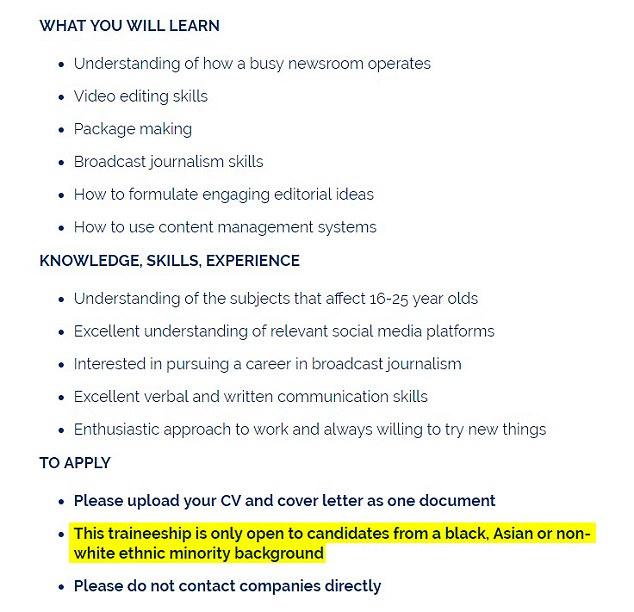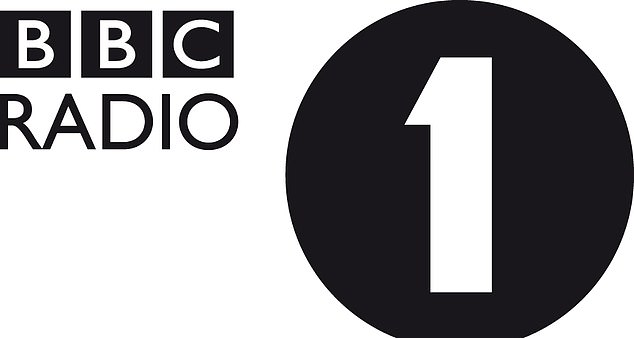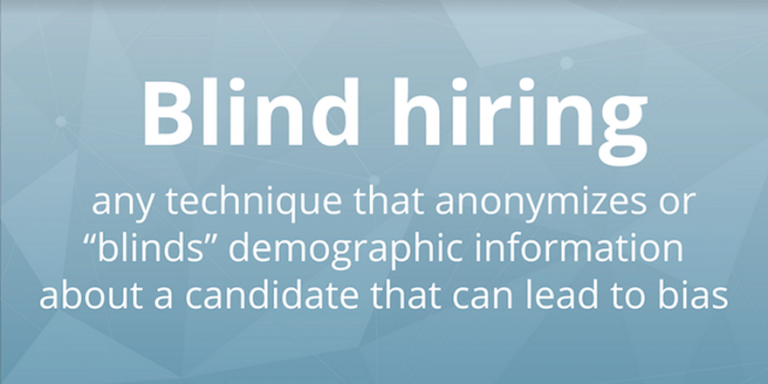A BBC Traineeship is not accepting applications unless you are from a lower socioeconomic and/or BAME background which is considered against the employment law.
The Traineeship is for a Trainee Journalist role paying £20,000 a year. If successful, the applicant will be placed at the UK’s biggest radio stations, BBC Radio 1, in the London Officer for a year.

If it is classed as a job it is illegal, and unlawful in the UK, under the 2010 Equality. Since it is marketed as a Traineeship it is a ‘development opportunity’ and not a job.
Philip Landau, an employment lawyer from the specialist employment law firm Landau Law, said: “The Equality Act does allow organisations to take ‘positive action’ to encourage under-represented groups to apply for jobs or to participate in other opportunities. The steps can include measures to encourage or train people from an under-represented group to apply for jobs. Positive action of this kind is only allowed if an employer can demonstrate that it is limiting applications to overcome the disadvantage suffered by minority groups, and the steps taken to do this are ‘proportionate’. However, a strict policy which treats persons of a disadvantage group more favourably than others and regardless of merit is not something which is allowed under the Act.”
Lawyer Philip Landau says: “No group should be excluded altogether, whatever their ethnic make-up, background or nationality. No group should be excluded altogether, whatever their ethnic make-up, background or nationality. As this advertisement is effectively a blanket ban on white applicants, that is more akin to positive discrimination, which under the Equality Act is unlawful. The BBC has previously suggested that these roles are more ‘training opportunities’ rather than ‘jobs’, however it is still likely that the applicant will be treated as an employee or worker, and of course, they are remunerated for their work, which differentiates from some internships.”
The BBC’s advert for the traineeship has proclaimed it offers the “ideal environment for providing gradual multi-media training that is so rewarding to experience early in a journalism career”.
The position claims to also ensure the successful candidate is in “prime position” for “future Newsbeat and BBC News opportunities”.
“It is a genuinely unique opportunity for a budding journalist with their finger on the pulse of contemporary culture.”
A BBC spokesperson said: “This is a training programme – not a job. It is a scheme for organisations who want to address under-representation in their business in a lawful way and, like many other media organisations, we’re proud to be taking part.”
Mr Landau said: “A traineeship is still a job, although trainees will often be on a fixed term contact which will have a specified end date, unlike a full or part-time employee. They may or may not be taken on permanently after the period of training has been completed.”
Positive Discrimination
This BBC Traineeship is a form of Positive discrimination.
Positive discrimination (employing someone because they have a protected characteristic) is unlawful in the UK but positive action means that in some situations, companies can help certain groups access employment.
It targets a certain group of people ethnically and socio-economically. How else will BAME and lower socioeconomic individuals move up the pecking order of a media industry that is largely white-dominated?

BAME individuals and those from lower socioeconomic backgrounds have built up their own networks, developed themselves beyond belief and sometimes may require a helping hand.
When we think of the media outlets we typically see white-centred narratives. In an attempt to appeal to all audiences the media is desperately trying to diversify from the top which will trickle down to the bottom.
BBC’S attempt at diversity
The BBC is the UK’s largest broadcaster, the BBC’s position on diversity is evident as by 2020, the BBC wants its employees to comprise 50% women, 8% disabled people, 8% Lesbian, Gay, Bisexual or Transgender people and 15% people from Black, Asian and Ethnic Minority backgrounds.
This is a start towards a more representative media.
Possible Solutions

Many audiences have been disgusted by the BBC and their approach to diversity. Some have refused to pay for their BBC licenses in a protest against this traineeship. Comments as “The British Broadcasting Company, should look and sound British”, highlighting the attitudes of some sections of society.
The call for Blind CV’s could change this for all audiences. Blind CV’s remove identifying information from CV’s such as age, race or gender. Race and gender being of huge importance in our society today.
Blind hiring was made mainstream in 1952 by the Boston Symphony Orchestra. The orchestra asked musicians to audition behind a screen, this aided the orchestra to begin accepting more women. A later research paper concluded that blind auditions increased the chance of a woman being accepted by an orchestra, by 50 percent.
This is due to the subconscious bias in the process of recruiting which severely impacts the demographic of any company, or organisation. It also feeds into the tired narrative of certain institutions remaining the same for generations.
My worry is that with age, race and gender removed, people can still judge someone simply from where they have been educated, so do we also remove education in an attempt to level the playing field? It may sound pedantic, but educational institutions such as Cambridge and Oxford are well renowned and still manufacture bias in peoples minds.
Blind CV’s could be the way forward to prevent organisations missing out on the best, on either side of the racial and socioeconomic scale.
The Future
The media industry has begun to represent the variants of the British identity, and it is very much needed. As in Britain, you can find someone from every single country in London alone. This is a reminder of the multicultural metropolis London has become.
Where there is a will there is a way and it seems positive discrimination is the unfortunate necessity to redress the imbalances in the media.
The need for diversity comes from the typical characterization of continuing conflict and the ever-present ambition of change. A change that sees a ranging media with a plethora of narratives that help to cater to more than one audience. It is evident there is a lack of representation of ethnic minorities. After all, the importance of having a representative media is clear, given that “media cannot reflect society if society is not reflected in the media”. The media should reflect the plurality of our society.
The BBC Traineeship Journalism Role simply opens the door, for those who may not ordinarily have the chance, be able to have unpaid internships or work experience. The role does not guarantee the job. It simply puts the BAME and lower socio economic candidates at somewhat of a leveled playing field.


